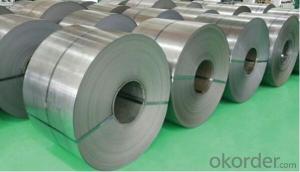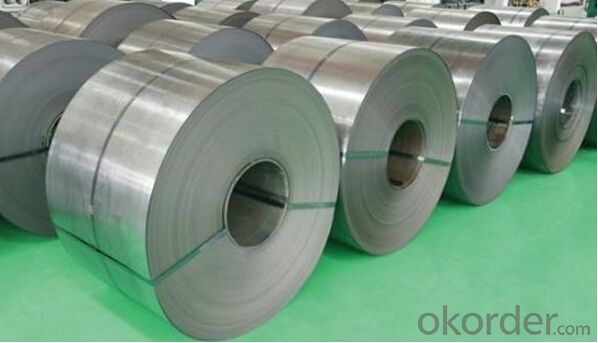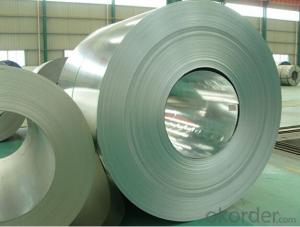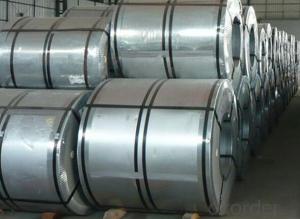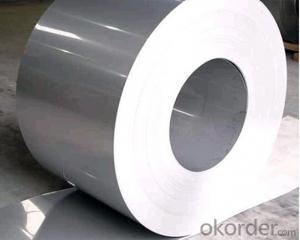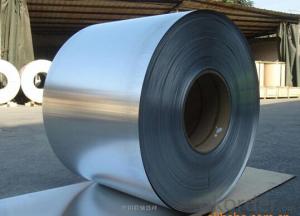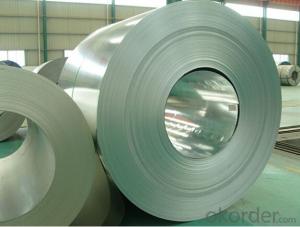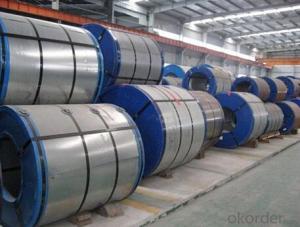Grade JIS G3141-SPCC-1B Galvanized Steel Coil
- Loading Port:
- Tianjin
- Payment Terms:
- TT OR LC
- Min Order Qty:
- 3 m.t.
- Supply Capability:
- 10000 m.t./month
OKorder Service Pledge
OKorder Financial Service
You Might Also Like
Specification
Grade JIS G3141-SPCC-1B Galvanized Steel Coil
Specification of Grade JIS G3141-SPCC-1B Galvanized Steel Coil
1. Galvanized Steel Coil
(1) Width: 600-1570mm
(2) Thickness: 0.13-5.0mm
(3) Grade: JIS G3302-SGCC-SGC570, SGCH (full hard-G550), SGHC-SGH540
EN10346-DX51D+Z, DX53D+Z, S250GD-S550GD
STM A653-CS-B, SS255-SS550
(4) Zinc Coating: Z40g/m2~Z500g/m2 (both side total coating thickness)
2. Galvalume Steel Coil
(1) Width: 600~1500mm
(2) Thickness: 0.15~2.30mm
(3) Grade: JIS G3321-SGLCC, SGLC400-570, (G550)
EN10346-DX51D+AZ, DX53D+AZ, S250-S550
ASTM A792M CS-B, SS255-SS550
(4) AZ Coating: AZ50~AZ185g/m2
3. Prepainted Galvanized Steel Coil (PPGI)
(1) Width: 600~1250mm
(2) Thickness: 0.19~1.50mm
(3) Grade: JIS G3312-CGCC, CGC340-570, (G550)
ASTM A755M CS-B, SS255-SS550
(4) Zinc Coating: Z40g/m2~Z500g/m2 (both side total coating thickness)
4. Prepainted Galvanized Steel Coil (PPGL)
(1) Width: 600~1250mm
(2) Thickness: 0.20~1.50mm
(3) Grade: JIS G3322-CGLCC, CGLC340-570, (G550)
ASTM A755M CS-B, SS255-SS550
(4) AZ Coating: AZ50~AZ185g/m2 (both side total coating thickness)
5. Cold Rolled Steel Coil (Soft) (for further information, pls click the product name)
(1) Width: 600~1570mm
(2) Thickness: 0.13~2.50mm
(3) Grade: JIS G3141-SPCC-SD, SPCD-SD, SPEC-SD
JIS G3135-SPFC 340/390/440
EN10130-DC01, DC03, DC04
SAE1006, SAE1008
ASTM A424-TypeⅡ
6. Cold Rolled Steel Coil (Full Hard) (for further information, pls click the product name)
(1) Width: 600~1570mm
(2) Thickness: 0.13~2.50mm
(3) Grade: JIS G3141-SPCC-1B, SPCC-1D
7. Hot Rolled Steel Coil
(1) Width: 1000~1524mm
(2) Thickness: 1.20~16.5mm, other thickness can be negotiation
(3) Grade: JIS G3101-SS400, JIS G3132-SPHT1/2/3, ASTM A36, Q195, Q235 etc.
Company Introduction of the Grade JIS G3141-SPCC-1B Galvanized Steel Coil
CNBM International Corporation is the most import and export platform of CNBM group(China National Building Material Group Corporation) ,which is a state-owned enterprise, ranked in 270th of Fortune Global 500 in 2015.
With its advantages, CNBM International are mainly concentrate on Cement, Glass, Iron and Steel, Ceramics industries and devotes herself for supplying high quality series of refractories as well as technical consultancies and logistics solution.
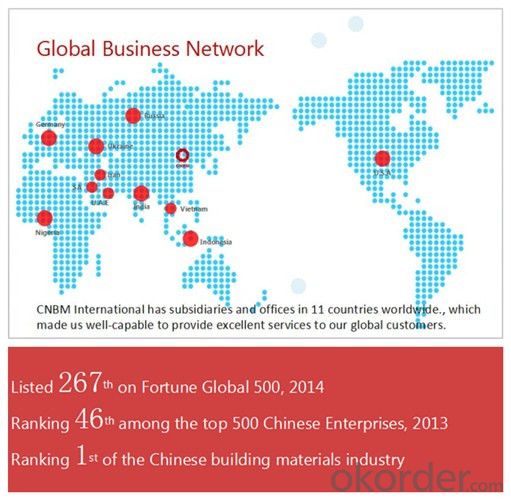
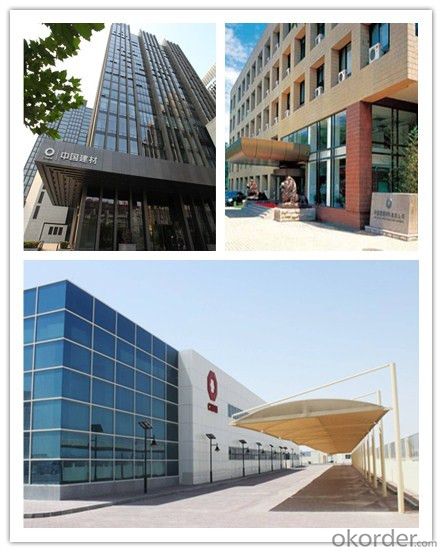
Packaging & Delivery of the Grade JIS G3141-SPCC-1B Galvanized Steel Coil
Packaging Detail | Sea worthy packing /as per customer's packing instruction |
Delivery Detail | 15 ~ 40 days after receiving the deposit |
Products Show:
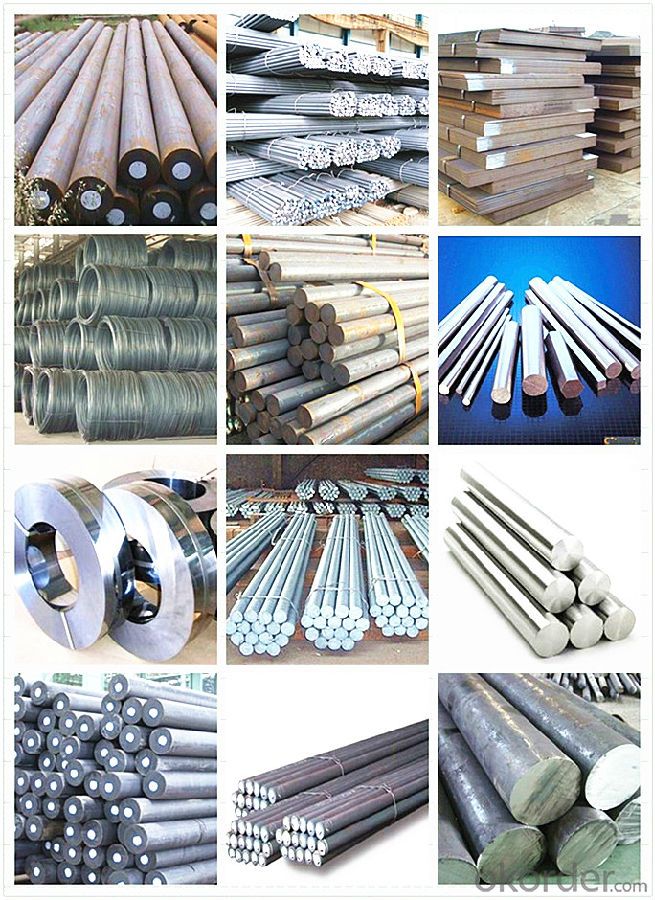
FAQ:
Are you a trading company or manufacturer? | Manufacturer |
What’s the MOQ? | 3 metric ton |
What’s your delivery time? | 15-35 days after downpayment received |
Do you Accept OEM service? | Yes |
what’s your delivery terms? | FOB/CFR/CIF |
What's the Payment Terms? | 30% as deposit,70% before shipment by T/T |
Western Union acceptable for small amount. | |
L/C acceptable for large amount. | |
Scrow ,Paybal,Alipay are also ok | |
Why choose us? | Chose happens because of quality, then price, We can give you both. Additionally, we can also offer professional products inquiry, products knowledge train (for agents), smooth goods delivery, excellent customer solution proposals. |
What's your available port of Shipment? | Main Port, China |
What’s your featured services? | Our service formula: good quality+ good price+ good service=customer's trust
|
Where are your Market? | Covering more than 160 countries in the world |
- Q: How does bearing steel resist fatigue?
- Bearing steel resists fatigue due to its high strength, hardness, and excellent resistance to wear and impact. It is specifically designed to withstand repeated loading and stress cycles without undergoing deformation or failure. Additionally, the steel's microstructure is carefully engineered to enhance its resistance to fatigue by distributing stress evenly and minimizing the formation of cracks or fractures.
- Q: What are the different surface coating methods used for special steel?
- Special steel can be enhanced and protected from environmental factors using various surface coating methods. These methods include: 1. Galvanizing: Zinc is applied to the steel surface, offering exceptional corrosion resistance. This can be achieved through hot-dip galvanizing or electroplating. 2. Electroplating: A thin layer of metals like chromium, nickel, or copper is deposited onto the steel surface using an electrochemical process. This improves appearance, wear resistance, and corrosion resistance. 3. Powder coating: Dry powder is applied to the steel surface, heated, and fused to create a protective layer. This provides durability, weather resistance, and aesthetic appeal. 4. Thermal spray coating: A heated or molten material is sprayed onto the steel surface, solidifying into a protective coating. Materials like metals, ceramics, and polymers are commonly used. 5. Paint coating: Painting is a widely used method for surface coating. Epoxy, polyurethane, or acrylic paints can be applied to protect against corrosion, chemicals, and UV radiation. 6. PVD coating: A thin film of materials like titanium nitride or diamond-like carbon is deposited onto the steel surface through vacuum deposition. PVD coatings enhance hardness, wear resistance, and appearance. 7. Anodizing: Primarily used for aluminum, anodizing can also be applied to special steel. It involves creating an oxide layer through an electrochemical reaction, improving corrosion resistance and providing a decorative finish. These surface coating methods are crucial for special steel as they enhance protection against corrosion, wear, and environmental factors. This ultimately extends the steel's lifespan and improves its performance. The choice of coating method depends on the specific requirements and desired properties of the steel.
- Q: What are the main advantages of using special steel in the aerospace industry?
- The main advantages of using special steel in the aerospace industry are its high strength-to-weight ratio, excellent corrosion resistance, and superior heat and wear resistance. These properties make special steel ideal for constructing aircraft components that need to withstand extreme conditions, such as high temperatures, pressure, and stress. Additionally, special steel offers excellent fatigue resistance, ensuring the longevity and reliability of aerospace structures.
- Q: What are the different methods for improving the fatigue strength of special steel?
- There are various ways to enhance the fatigue strength of special steel: 1. Heat treatment is a commonly used approach, involving processes like annealing, quenching, and tempering. These treatments refine the steel's microstructure, reduce impurities, and boost fatigue resistance. 2. Surface treatments, such as shot peening and nitriding, can also enhance fatigue strength. Shot peening bombards the steel surface with small metal particles, inducing compression stress that prevents crack formation and propagation. Nitriding diffuses nitrogen into the surface layer, creating a hard and wear-resistant nitride layer that improves fatigue resistance. 3. Alloying special steel with specific elements, like chromium, molybdenum, or vanadium, can significantly improve fatigue strength. These elements form carbides or nitrides, acting as barriers against crack propagation. 4. Applying protective surface coatings, like electroplating, hot-dip galvanizing, or physical vapor deposition (PVD), can enhance fatigue strength. These coatings act as barriers against environmental factors that may cause corrosion or surface damage, ultimately extending the steel's fatigue life. 5. Grain refinement can be achieved through processes like severe plastic deformation or equal channel angular pressing (ECAP). By refining the grain size, the steel's fatigue strength can be improved, as fine-grained steels have higher resistance to crack initiation and propagation. 6. Residual stress management plays a crucial role in enhancing fatigue strength. Techniques like stress relieving or shot peening can reduce tensile residual stresses, which are detrimental to fatigue resistance. It's important to consider specific requirements, the type of special steel, and the intended application when selecting the most suitable method for improving fatigue strength.
- Q: Can special steel be used in electrical applications?
- Special steel can indeed find its use in electrical applications. There exist specific properties in special steel alloys, like stainless steel or tool steel, that render them appropriate for usage in electrical applications. These properties encompass excellent electrical conductivity, remarkable resistance against corrosion, and commendable strength. To illustrate, stainless steel frequently finds its application in electrical enclosures, wire mesh, and connectors, owing to its ability to ward off corrosion caused by moisture or chemicals. Conversely, tool steel is commonly employed in the production of electrical tools and equipment, such as pliers or screwdrivers, due to its superior strength and durability. On the whole, special steel alloys can provide the desired electrical properties and performance required for diverse electrical applications.
- Q: How does the carbon content affect the properties of special steel?
- The properties of special steel are determined by the carbon content, playing a crucial role. Adding carbon to the steel modifies its microstructure and influences various mechanical and physical properties. The main impact of carbon content is on the steel's hardness and strength. Raising the carbon content in special steel leads to an increase in hardness. This occurs because carbon atoms occupy the interstitial sites in the iron lattice, causing a distortion in the crystal structure. Consequently, the steel becomes more resistant to deformation. Additionally, a higher carbon content results in a greater martensitic transformation during heat treatment, further enhancing the material's hardness. Moreover, the strength of special steel is significantly affected by the carbon content. Increased carbon levels lead to greater strength due to the formation of stronger and more abundant carbide precipitates. These carbides act as obstacles to the movement of dislocations, making it more challenging for the steel to deform under load. However, it is important to acknowledge that higher carbon content comes with certain trade-offs. As the carbon content increases, the steel's ductility decreases. This means that the material becomes less capable of deforming without fracturing. High carbon content can make the steel brittle, reducing its toughness and impact resistance. In addition to hardness and strength, carbon content impacts other properties of special steel. It affects the material's wear resistance, as higher carbon content leads to the formation of harder carbides that can withstand wear and abrasion. Carbon also influences the steel's machinability, with higher carbon content making the material more difficult to machine due to increased hardness. In conclusion, the carbon content significantly influences the properties of special steel. It affects hardness, strength, ductility, toughness, wear resistance, and machinability. Therefore, when determining the appropriate carbon content for special steel, careful consideration of desired properties and application requirements is necessary.
- Q: What are the specific requirements for special steel used in the marine industry?
- Special steel used in the marine industry must meet specific requirements to ensure its suitability for the harsh marine environment. These requirements include high strength, corrosion resistance, and toughness. Firstly, high strength is crucial for special steel used in the marine industry as it needs to withstand the extreme loads and stresses experienced at sea. This strength allows the steel to resist deformation and maintain structural integrity under heavy loads, such as the weight of the ship itself or the forces generated by waves and wind. Corrosion resistance is another vital requirement for marine-grade steel. The presence of saltwater, which is highly corrosive, poses a significant challenge. Special steel for the marine industry should have excellent resistance to corrosion, preventing the formation of rust and other forms of degradation. This resistance ensures the longevity of the steel structures and reduces maintenance and repair costs. Toughness is also essential in marine-grade steel. It must be able to withstand impact and shock loads, as ships and offshore structures are constantly exposed to rough seas and potential collisions. The steel should possess the ability to absorb and distribute energy without fracturing or failing, ensuring the safety and reliability of the marine structures. In addition to these requirements, special steel used in the marine industry must also meet specific standards and certifications, such as those set by classification societies like the American Bureau of Shipping (ABS), Lloyd's Register (LR), or Det Norske Veritas Germanischer Lloyd (DNV GL). These organizations set standards for materials, construction, and inspection processes to ensure the reliability and safety of marine structures. Overall, the specific requirements for special steel used in the marine industry include high strength, corrosion resistance, toughness, and compliance with industry standards and certifications. Meeting these requirements ensures the steel's ability to withstand the unique challenges posed by the marine environment and helps ensure the safety and longevity of marine structures.
- Q: What are the main advantages of using special steel in the construction of bridges?
- The main advantages of using special steel in the construction of bridges are its high strength-to-weight ratio, excellent corrosion resistance, and durability. Special steel possesses superior mechanical properties, allowing for the construction of lighter and more efficient bridge structures. It also offers enhanced resistance to environmental factors like moisture, temperature variations, and chemical exposure, leading to longer service life and reduced maintenance costs. Additionally, special steel facilitates the use of innovative and complex bridge designs, enabling architects and engineers to create unique and aesthetically pleasing structures.
- Q: What are the applications of special steel in the medical field?
- The medical field benefits greatly from the unique properties and characteristics of special steel, which has a wide range of applications. Surgical instruments are one major area where special steel, such as stainless steel, is extensively used. These instruments, including scalpels, forceps, scissors, and surgical needles, require strength, durability, and resistance to corrosion. Special steel provides the necessary qualities to ensure these instruments maintain their sharpness and integrity even after repeated use and sterilization. Another important application of special steel in healthcare is the production of implants and prosthetics. Various special steel alloys, such as titanium alloys, cobalt-chromium alloys, and nickel-titanium alloys, are commonly employed to manufacture orthopedic and dental implants, as well as other medical devices. These alloys possess excellent biocompatibility, corrosion resistance, and mechanical strength, which make them ideal for long-term implantation within the human body. Special steel also plays a crucial role in the construction of medical equipment and machinery. Diagnostic machines like MRI scanners and X-ray machines often incorporate special steel components due to their magnetic properties and ability to withstand high temperatures. By utilizing special steel, the accuracy, reliability, and safety of these devices are ensured. Furthermore, special steel is used in the manufacturing of medical storage and transportation systems. Steel cabinets, trolleys, and containers are commonly used to store and transport medical supplies, instruments, and samples. The use of special steel in these systems guarantees durability, hygiene, and a long lifespan. Special steel is easy to clean, resistant to contamination, and maintains its quality over time. In conclusion, special steel is extensively utilized in the medical field for a variety of purposes. From surgical instruments to implants, medical equipment to storage systems, special steel is an essential material that contributes to the effectiveness, reliability, and safety of medical procedures and treatments. Its unique properties make it an indispensable resource in the healthcare industry.
- Q: How does special steel contribute to the aviation industry?
- Special steel plays a crucial role in the aviation industry by contributing to the safety, performance, and efficiency of aircraft. Firstly, special steel is used in the manufacturing of critical components of aircraft, including landing gears, engine parts, and structural elements. These components require materials with exceptional strength, durability, and resistance to fatigue and corrosion. Special steel, such as stainless steel or nickel-based alloys, offers these properties, ensuring the structural integrity and safety of the aircraft. Secondly, special steel enables the development of lightweight aircraft, which is a key requirement in the aviation industry. By utilizing high-strength alloys, manufacturers can reduce the weight of aircraft components without compromising their structural integrity. This results in fuel savings, extended range, and increased payload capacity, ultimately enhancing the efficiency of aircraft operations. Furthermore, special steel is crucial in enhancing the performance and reliability of aircraft engines. Steel alloys with high-temperature resistance and excellent mechanical properties are used in the production of turbine blades, combustion chambers, and exhaust systems. These components withstand extreme temperatures and stress levels, allowing engines to operate efficiently and reliably. Moreover, special steel contributes to the aviation industry by enabling innovative designs and technologies. With continuous advancements in material science, manufacturers are able to develop new steel alloys with improved properties, such as enhanced resistance to wear, thermal stability, or fatigue resistance. These innovations unlock new possibilities for aircraft design, performance, and fuel efficiency. In conclusion, special steel plays a vital role in the aviation industry by ensuring the safety, performance, and efficiency of aircraft. Its use in critical components, lightweight construction, engine manufacturing, and technological advancements contributes to the advancement of aviation, making air travel safer, more efficient, and more sustainable.
Send your message to us
Grade JIS G3141-SPCC-1B Galvanized Steel Coil
- Loading Port:
- Tianjin
- Payment Terms:
- TT OR LC
- Min Order Qty:
- 3 m.t.
- Supply Capability:
- 10000 m.t./month
OKorder Service Pledge
OKorder Financial Service
Similar products
Hot products
Hot Searches
Related keywords
